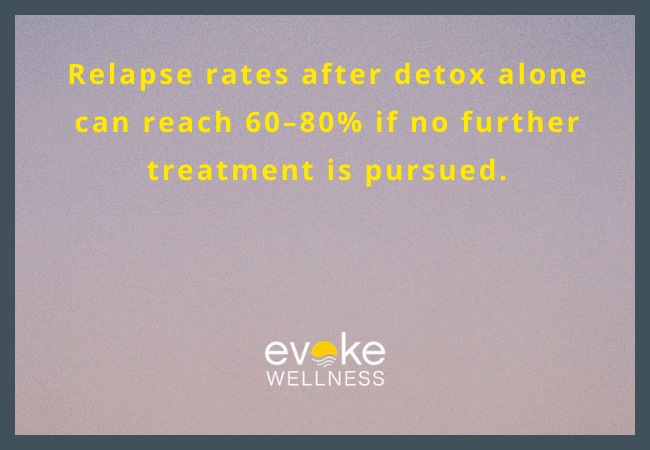Recovery is not a single event—it’s a journey. For those struggling with drug or alcohol addiction, the first step is often medical detox. This critical phase helps rid the body of substances while managing withdrawal symptoms. However, completing detox is only the beginning. The next step, inpatient rehab, is just as important—if not more—for building the emotional resilience, psychological insight, and coping strategies needed for lasting sobriety.
At Evoke Wellness, we support clients through each step of this process, ensuring a smooth and supportive transition from detox to inpatient rehab. Our comprehensive continuum of care is designed to promote healing and stability from the moment a person walks through our doors.
Why Detox Is Just the First Step
Detoxification plays a vital role in the recovery process, especially for those who are physically dependent on drugs or alcohol. It helps to cleanse the body, minimize health risks, and prepare individuals for deeper therapeutic work. Detox alone, however, does not address the underlying psychological, emotional, and behavioral factors that contribute to addiction. Without continued care, individuals are at high risk of relapse.
That’s why the transition from detox to inpatient rehab is so important. At Evoke Wellness, we guide individuals seamlessly into the next level of care once they have stabilized, making sure the momentum for recovery isn’t lost.
Understanding the Detox Process
During detox, clients receive 24/7 medical supervision to help manage withdrawal symptoms safely and comfortably. Each client’s detox plan is tailored to their substance use history, physical health, and risk factors. This could involve tapering off substances, receiving medication-assisted treatment (MAT), and undergoing regular monitoring for complications.
The length of detox varies depending on the substance involved, but the process typically lasts from a few days to one week. Symptoms like anxiety, insomnia, nausea, sweating, and agitation may occur, and in more severe cases, complications such as seizures or hallucinations require immediate medical attention.
For example, individuals coming from a Drug Detox Center in Ohio often benefit from a structured, supportive program that helps manage physical withdrawal while preparing the mind for therapy and personal growth in inpatient care.
What Happens After Detox?
Once a client is medically stable and cleared by the treatment team, the transition to inpatient rehab begins. This step is not only logistical—it’s emotional. Many people feel vulnerable and uncertain after detox, unsure of what comes next or how they will cope without substances.
At Evoke Wellness, our compassionate team provides encouragement, education, and clear next steps to ease that transition. We help clients understand that inpatient treatment is where the deeper healing begins.
Inpatient rehab offers a safe, structured environment where clients live on-site and receive comprehensive therapeutic support. It is ideal for those who need a high level of care due to the severity of their addiction, co-occurring mental health conditions, or unstable home environments.
Preparing for the Transition: What to Expect
The transition from detox to inpatient rehab is thoughtfully coordinated to minimize stress and maximize continuity. Here’s what clients can expect during this handoff:
-
Clinical Assessment: Before entering inpatient care, clients complete an in-depth evaluation to assess their psychological, emotional, and physical needs.
-
Treatment Planning: A personalized treatment plan is developed based on the assessment. This includes the types of therapy offered, medical support, and holistic services.
-
Introduction to the Community: Clients are introduced to peers and staff in the inpatient program, helping them feel connected and supported.
-
Routine and Structure: Upon entry into rehab, clients begin following a structured daily schedule of therapy, wellness activities, and personal reflection.
This seamless transition eliminates the fear of the unknown and helps clients maintain the progress they began during detox.
Life Inside Inpatient Rehab
Once in inpatient rehab, clients at Evoke Wellness engage in a full schedule of evidence-based and holistic therapies. These therapies are designed to uncover the root causes of addiction, heal past trauma, and develop healthy coping skills for life outside treatment.
Typical components of inpatient rehab include:
-
Individual Therapy: One-on-one sessions with a licensed therapist help address personal challenges and track progress.
-
Group Therapy: Peer support sessions foster connection, accountability, and emotional insight.
-
Family Therapy: Guided conversations with loved ones promote healing and rebuild trust.
-
Cognitive Behavioral Therapy (CBT): Helps clients identify and shift negative thought patterns.
-
Dialectical Behavior Therapy (DBT): Teaches skills for emotion regulation and distress tolerance.
-
Medication Management: When necessary, psychiatric care supports mental health stability.
Many individuals who come to us from an Intensive Inpatient Treatment Program in Ohio report that the consistency and accountability provided during residential treatment made a significant difference in their recovery outcomes.
Supporting Mental Health During the Transition
The transition from detox to inpatient rehab can stir up intense emotions, including fear, grief, anger, or sadness. That’s why mental health support is an integral part of our approach. Co-occurring disorders such as anxiety, depression, PTSD, or bipolar disorder are common among those in recovery, and failing to treat these issues can increase the risk of relapse.
At Evoke Wellness, we prioritize integrated care that treats both addiction and mental health concerns. Our trauma-informed team creates a safe space for clients to explore difficult emotions and develop effective coping mechanisms.
Whether someone is coming from an Alcohol Detox Center in Ohio or has completed detox for other substances, our holistic approach ensures they receive the emotional care they need to succeed in inpatient treatment.
Why Continuity of Care Matters
Disruptions in treatment—such as long gaps between detox and rehab—can negatively impact recovery. The brain and body are in a vulnerable state during early sobriety, and any delay in continued care can lead to uncertainty or even relapse.
Evoke Wellness offers a smooth, integrated pathway from detox to inpatient care to ensure there is no pause in healing. Our staff remains actively involved in each phase of the journey, communicating openly with clients, answering questions, and adapting treatment plans as needed.
We believe that continuity of care builds confidence, trust, and momentum—all essential qualities for long-term success.
The Role of the Care Team
Our multidisciplinary care team is at the heart of every client’s recovery journey. From detox to rehab, clients are supported by:
-
Licensed addiction counselors
-
Psychiatrists and psychiatric nurse practitioners
-
Medical doctors and nurses
-
Case managers and social workers
-
Wellness and holistic health practitioners
This team-based approach ensures every aspect of a client’s well-being is addressed. We collaborate closely to monitor progress, adjust care, and offer encouragement every step of the way.
A Safe and Healing Environment
Environment plays a crucial role in recovery. Our inpatient rehab facilities offer a peaceful, structured, and welcoming atmosphere where clients can feel safe and cared for. Comfortable living spaces, nutritious meals, and wellness activities such as yoga or meditation help foster healing on all levels.
Clients also benefit from being surrounded by others who understand the struggles of addiction. Peer support can be deeply motivating and reassuring during times of doubt or emotional discomfort.
Aftercare Planning for Continued Success
Inpatient rehab is a powerful phase of treatment, but recovery doesn’t end when someone completes their stay. That’s why we begin aftercare planning early. Clients work with their team to build a comprehensive discharge plan that includes:
-
Step-down programs like intensive outpatient care
-
Continued therapy sessions
-
Support group referrals
-
Alumni services and community events
-
Relapse prevention strategies
The goal is to equip each client with the tools, support, and resources they need to thrive in real life. Recovery is ongoing, and we are committed to helping our clients stay strong long after their inpatient experience ends.
Why Choose Evoke Wellness?
At Evoke Wellness, we understand that transitioning from detox to inpatient rehab is a critical—and often emotional—step in the recovery journey. That’s why we go above and beyond to make this process as smooth, empowering, and compassionate as possible.
We are proud to offer personalized, evidence-based care from a team of licensed professionals who are deeply committed to our clients’ well-being. With a comprehensive approach that addresses physical health, mental health, and emotional growth, we give individuals the tools they need to break free from addiction and build a life of stability, peace, and purpose.
Whether you’re entering our program directly or coming from another facility such as a Drug Detox Center in Ohio, we welcome you into a healing environment that honors your journey and supports your goals. Our partnerships with programs across the country—including the Intensive Inpatient Treatment Program in Ohio and Alcohol Detox Center in Ohio—allow us to guide clients through every phase of recovery with continuity and care.
Conclusion
The transition from detox to inpatient rehab is one of the most important steps in addiction recovery. It’s where the real work begins—where healing deepens, insight is gained, and change takes root. At Evoke Wellness, we walk beside you through every part of this transition, offering structure, compassion, and comprehensive care to help you succeed.
If you or a loved one is ready to move forward after detox, we’re here to help. Call us today at 866.430.9267 to learn more about our inpatient rehab services and begin your journey toward a healthier, substance-free life.
Frequently Asked Questions (FAQs)
Why is it important to move from detox to inpatient rehab?
Detox addresses the physical symptoms of withdrawal, but inpatient rehab focuses on the emotional and psychological factors of addiction. Without continued treatment, the risk of relapse is significantly higher.
How soon should I transition from detox to inpatient rehab?
The transition should occur immediately after detox is complete to maintain recovery momentum and minimize relapse risks. At Evoke Wellness, we ensure a seamless, guided process between levels of care.
What therapies are included in inpatient rehab?
Inpatient rehab includes individual therapy, group therapy, family therapy, cognitive-behavioral therapy (CBT), medication management, and holistic services like mindfulness and wellness programs.
What is the difference between detox and inpatient rehab?
Detox is the medical process of clearing substances from the body and managing withdrawal. Inpatient rehab involves intensive therapy and structured support to address the root causes of addiction.
Will I have support during the transition?
Yes. Our multidisciplinary care team supports you throughout the entire process—evaluating your needs, developing a personalized treatment plan, and helping you adjust to your new environment.
Is mental health care included in inpatient rehab?
Absolutely. Evoke Wellness offers integrated mental health care for clients with co-occurring disorders such as depression, anxiety, PTSD, and more.
What happens after inpatient rehab?
Before discharge, we help you develop a personalized aftercare plan, which may include outpatient therapy, support groups, and relapse prevention strategies to ensure long-term recovery.



